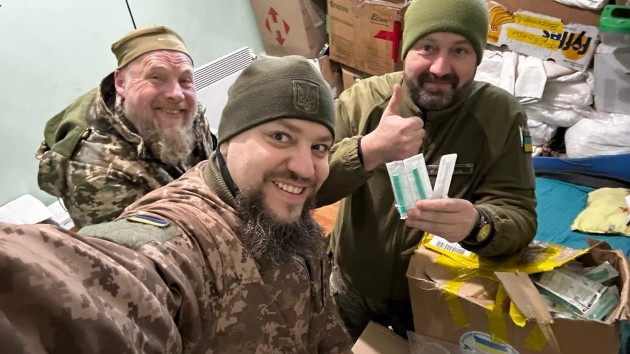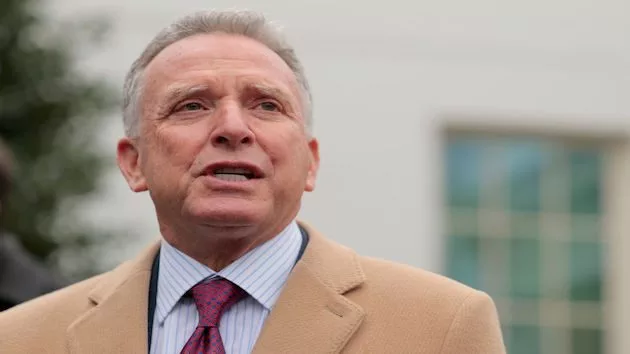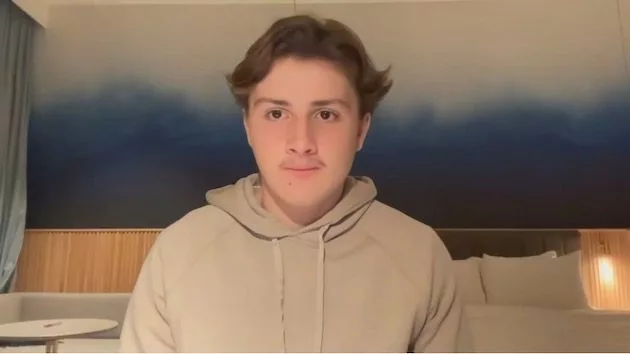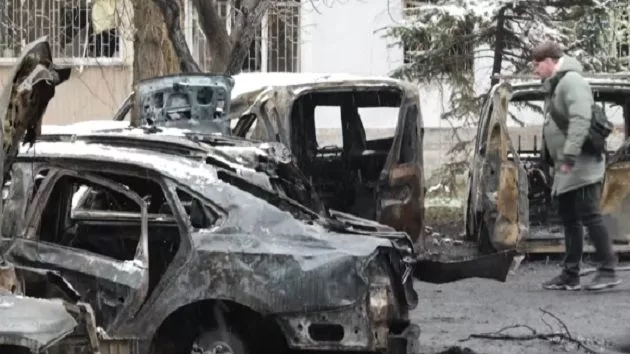(LVIV, Ukraine) — After 21 months serving as a commander of the Ukrainian forces’ medical company А4350, Andriy Zholob, a 43-year-old senior lieutenant, has returned home to Lviv.
He ended up home only because of his 83-year-old mother’s illness, he told ABC News. He’s an only son, so he had the right to terminate his service in order to take care of her.
Zholob, who in peaceful life was a traumatologist, radio anchor, guitarist and a vocalist in a punk-rock band called “Beton” — or “Concrete,” in Ukrainian — was demobilized from the Donetsk region in eastern Ukraine. He had served in an area close to fierce hostilities, where the Russian forces managed to advanced lately.
“The war is dung, mire and bloody guts that will never be the right consequences,” said Zholob, whose evacuation point was about four kilometers from the front line.
Despite the recent success the Russians demonstrated in Avdiivka, the town that was abandoned by Ukrainian defense forces under the pressure of the aggressor, there was on visible higher number of injured.
“This is a very unstable wave-like indicator, there was no steady growth,” Zholob says.
At the same time, Zholob’s unit was very busy every day of his service in the Ukrainian South and East — normally as far as 10 kilometers from the fighting.
ABC news met Zholob for the first time in late March 2022 at the funeral of his friend and colleague, who worked at the same regional media outlet and died at the beginning of the Russian full-scale aggression against Ukraine.
At that point, Zholob was conscious that it was just a matter of time when he will be conscripted. Two months later, that became a reality — and an extremely emotional moment for his mother, wife and two daughters: “The rivers-oceans of tears, it was really difficult to speak there. Words were useless in this situation,” he recollected.
Although Zholob understood that there was a high chance of dying or being seriously injured and these thoughts were constantly swirling in his head, he tried to think of everything as tourist trip, just this time without his common friends from the youth scouting organization Plast.
So, he managed to enter a special military training center with a couple of sandwiches, a lot of hiking clothes, a knife, two cartons of cigarettes and a small guitar.
Besides Zholob, there were a lot of other frightened civilian doctors who were told, “Just in a month you will all be military doctors.”
The first trip near to the battle was quite memorable for Zholob — rocket fire from the Russian MLRS fire caught him in the act in the outside restroom, but, fortunately, the missiles missed and he managed to get to the trenches.
He said he remembers the front-line area as mutilated, dirty ground, like in a horror movie. But with some exceptions of civilization – since in this horror movie you can still order a flat white and sushi.
Due to Zholob’s opinion, this humorous and scout-type attitude to the challenges helped him a lot in interactions with other mobilized Ukrainian servicemen. By the end of the first week at the training center he and his comrades were singing together.
“In fact, at war, nobody cares whether you’re a Satanist, a punk rocker, or a gangster from a slum — the main thing is to respect others and be a good man,” Zholob said.
The most difficult part of this journey was the distance between him and his family. He took a couple of short vacations — about twice a year for 10 days he managed to get home.
“It was obviously too short, but the feeling of duty greatly added sobriety and understanding why it was so short,” he said.
Social media and messaging platforms helped him stay in touch with his wife and daughters, helping him keep a positive attitude.
“To discuss everything — it became a new family law for us, which really shook the skeletons out of the closet,” Zholob said.
He was completely transparent with his wife, Yaryna, telling her immediately about the Russian shelling of their position just to prevent her from spare emotions of uncertainty.
Simultaneously, Andriy began to write his own diary on Instagram and Facebook — calling the posts “Dr. Zholob’s notes” — that became a kind of psychological outlet for himself.
“You know, I keep thinking of the hero of Jules Verne’s novel, ‘The Mysterious Island,'[about] the war journalist Gideon Spilett who wrote his military notes under any circumstances. I somehow became such a Spillett,” he said.
Although the notes became quite popular, Andriy says, he realizes that, in fact, the pain of the war cannot be fully contained in the text, as it must be experienced or felt personally in order to be understood.
“At least I tried to convey to people in the rear what it is like to go through hell,” he said.
The “personal hell” of the medical service unit commander partially consisted of the responsibility Zholob took for the life and health of his subordinates.
“It’s a very wild feeling — to filter the order from above in such a way that its execution does not harm your people — to complete the task without losing fellow subordinates,” he said.
During their work near the front lines, Andriy and his men were dealing with various types of wounded soldiers and noticed a distinctively visible difference in street and positional battles’ outcomes. At first there are mostly wounds caused by bullets or grenades. As the war continued, those gave way to worse injuries caused by the enemy’s artillery, MLRS and aviation.
“Medics must be morally stronger than soldiers, as fatigue, exhaustion, and disappointment are common emotions that prevail over others among soldiers, and doctors have to psychologically ‘extract’ the boys from this pitch,” Zholob said.
The degree of his involvement into the salvation of the wounded is hard to overestimate — during the surgery Andriy didn’t pay attention to his own health while dealing with patients who might have been HIV positive, have had hepatitis or have other infections.
“When your gloves tear during work, and there is no time to replace them, it is rather an inconvenience — you immediately perform all the necessary steps for secondary sanitary safety, but the memory of such contact remains,” Zholob said.
When he returned to Lviv, Andriy passed the necessary blood tests and was very happy to realize that he was not infected, despite the work conditions in the military hospitals. That was a big relief for his wife and his daughters as well.
“We will certainly not expect from the state the same degree of care as we cared for our patients. But you have to get used to it now,” Zholob said bitterly, recalling how he also managed to take care of his mother via the phone from his position near the front lines.
“I heard that my mother suddenly began to speak badly and forget words, so, I asked my relatives to come in immediately and at the same time called an ambulance,” he said. “I talked to the ambulance doctor where to take her. I called the hospital and agreed that my mother would be admitted immediately and hospitalized in good hands.”
Besides watching after his mother’s health, Zholob now plans to return to his punk-rock band and begin work with veterans.
He said he understands that the war is far from its end. Due to Andriy’s personal observations, the feelings of soldiers in trenches under the influence of time and the reduction of international support now consist of a mixture of fatigue, hope and of disappointment periodically fueled by rumors — positive and negative.
“But in the end, we stand, because not standing is not an option,” he said.
Copyright © 2024, ABC Audio. All rights reserved.






